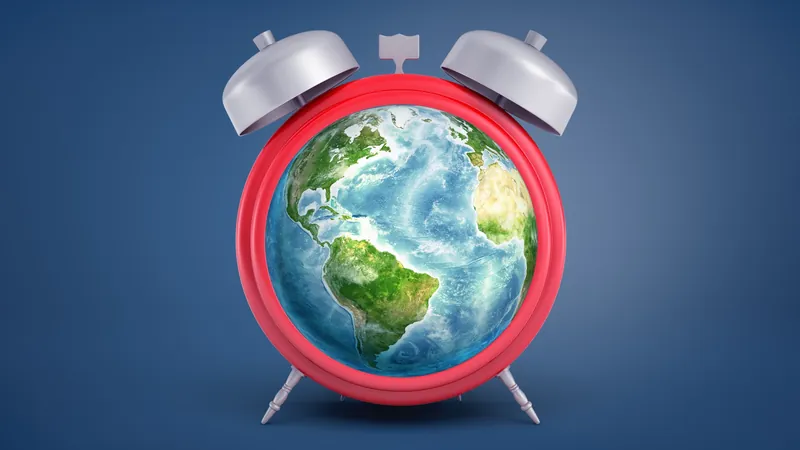
Is Earth Spinning Faster? Scientists Consider Unprecedented 'Negative Leap Second'
2025-07-24
Author: Ming
A Record-Breaking Speed: Earth's Rotation
Brace yourselves! Earth is spinning faster than ever, prompting global timekeepers to contemplate an extraordinary move—introducing a 'negative leap second'! That's right; for the first time in history, we might have to subtract a second from our clocks.
A Surprising Trend in Time
So far in 2023, July 9 and July 22 were heartbreakingly short—losing about 1.3 and 1.4 milliseconds, respectively. As if that weren't enough, August 5 is projected to be even shorter, slipping away with an expected loss of roughly 1.5 milliseconds!
The speed-up trend isn't just a fluke; scientists have been observing this since 2020. Dirk Piester, head of a time dissemination group in Germany, stated that our days are now slightly shorter than they have been for the last 50 years.
What’s Causing This Acceleration?
A full day on Earth is traditionally 86,400 seconds, or 24 hours. However, various factors—like the positioning of the sun and moon—affect our planet's rotation speed. On August 5, the moon’s placement will change gravitational influences, potentially speeding up Earth's rotation.
The Looming Leap Second Dilemma
Typically, variations in Earth's rotation balance out over time. But when they don't, timekeepers at the International Earth Rotation and Reference Systems Service (IERS) add a leap second based on discrepancies between atomic time and astronomical time.
Since leap seconds were first introduced in 1972, they've raised serious concerns. Technologies like GPS, banking systems, and even air traffic rely heavily on accurate timekeeping. Leap seconds can lead to errors in critical sectors, making synchronization even more complicated.
Could a 'Negative Leap Second' Be the Solution?
With Earth's increasing spin speed, scientists are seriously considering implementing a negative leap second. This would mean removing a second from Coordinated Universal Time (UTC) if astronomical time surpasses atomic time.
However, experts like Judah Levine from the National Institute of Standards and Technology caution against it, citing the complexities and potential errors that could arise from such an unprecedented step.
What Lies Ahead: The Future of Leap Seconds
While a negative leap second might seem unlikely this year, it could become a reality in the next decade. Experts estimate a 30% chance of it happening, but the future is uncertain.
Factors such as climate change, which might eventually slow down Earth's rotation due to shifting water distributions, could influence this decision.
Darryl Veitch, a networking professor, warns that despite recent observations of speed, Earth's long-term rotational trend leans toward a slowdown. The speeding days we experience now may just be a temporary aberration in a much larger timeline.



 Brasil (PT)
Brasil (PT)
 Canada (EN)
Canada (EN)
 Chile (ES)
Chile (ES)
 Česko (CS)
Česko (CS)
 대한민국 (KO)
대한민국 (KO)
 España (ES)
España (ES)
 France (FR)
France (FR)
 Hong Kong (EN)
Hong Kong (EN)
 Italia (IT)
Italia (IT)
 日本 (JA)
日本 (JA)
 Magyarország (HU)
Magyarország (HU)
 Norge (NO)
Norge (NO)
 Polska (PL)
Polska (PL)
 Schweiz (DE)
Schweiz (DE)
 Singapore (EN)
Singapore (EN)
 Sverige (SV)
Sverige (SV)
 Suomi (FI)
Suomi (FI)
 Türkiye (TR)
Türkiye (TR)
 الإمارات العربية المتحدة (AR)
الإمارات العربية المتحدة (AR)